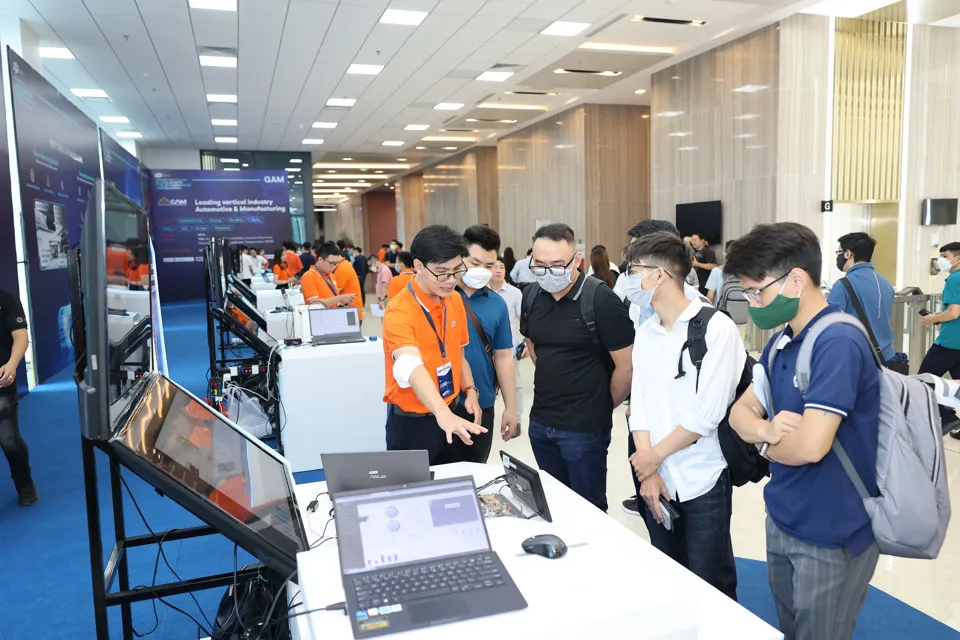Local firms demand incentives to develop tech industry
A draft action plan is being developed to accelerate the adoption of science and technology in production.
At the Vietnam Industry 4.0 Summit 2023 on June 14, the business community called for elaborate rules and incentives to make it easier for ICT companies to pursue digital transformation.
| Tech giant FPT Corporation showcases its AI products at an exhibition. Photo: Duy Khanh/The Hanoi Times |
To develop a fast-growing and sustainable digital industry, Vietnam needs to combine self-reliance, international cooperation, strong State management, and a solid market, said Phan Thi Thanh Ngoc, a specialist from the Vietnam Post and Telecommunications Corporation (VNPT).
"The focus should be on ICT enterprises and human resources, with the idea of “Make in Vietnam” as the foundation," she said.
Ngoc put forward five ideas that should be implemented to promote Vietnam's digital industry, including incentives for businesses in terms of taxes and tariffs and regulations on product quality control and foreign ownership.
She urged the Government to boost local demand for ICT products, attract foreign direct investment (FDI), and strengthen human resource management and training.
"With the popularization of IoT technologies, the development of e-commerce and smart cities, and the increasing use of technological solutions such as AI, AR/VR, and blockchain, Vietnam's digital industry has great potential for further growth," Ngoc said.
The Government needs to detail the rules for creating a market for green transition and digital transformation, said Tao Duc Thang, Chairman of Viettel Military Industry and Telecoms Group (Viettel).
"Ministries and local authorities should develop digital transformation programs that ICT companies can tap into," he said.
Do Thanh Trung, Deputy Minister of Planning and Investment, said a national action plan is being drafted to implement the Party Central Committee's decision on modernization and industrialization by 2045.
Under the action plan, technological progress and innovation are vital to improving productivity, efficiency, and competitiveness in all sectors.
The action plan also emphasizes the importance of comprehensive digital transformation and the import of technologies and production methods.
In addition, it will enable the completion of the regulatory framework for science and technology in terms of taxation, finance, credit and land use, develop collective industrial parks, encourage local enterprises to use eco-friendly methods, and facilitate the development of the robotics industry.
Nguyen Thien Nghia, Deputy Director of the Department of Information Technology and Communication Industry, said industrialization is a long-term undertaking. Vietnam is now producing integrated products, and smart solutions will be the key for local enterprises to automate their processes, optimize their costs, and reach end users quickly, he said.
AI taking the lead
Artificial intelligence (AI) has taken the lead in driving digital transformation in all sectors, said Deputy Minister of Science and Technology Bui The Duy.
"In the past six months, the world has seen a big wave of AI solutions, especially in photo and video editing. AI has changed the way we live and work," he said.
He said the ministry is working with Australian experts to develop the rules to hold AI developers and users responsible for their actions.
"There is still work to be done on the quality of human resources, infrastructure and data storage, and technology," Duy added.
Meanwhile, Duong Duy Hung from the Party Central Committee's Economic Commission said Vietnam should consider the digital industry one of the six core sectors. However, infrastructure development, high-quality human resources development, and regulatory framework are major challenges for Vietnam to develop a proper AI industry, Hung said.
According to PricewaterhouseCoopers, the world's leading auditing firm, AI will contribute a total of US$15.7 trillion to the global economy and create new jobs by 2030.
Vietnam's AI readiness indicator reached 51.82 out of 100 points in 2022, above the global average of 47.72 points. Vietnam also ranked 48th out of 132 nations in the World Intellectual Property Organization's Global Innovation Index in 2022.
The rankings show that Vietnam has a high capacity to access and develop AI solutions, Hung said.











